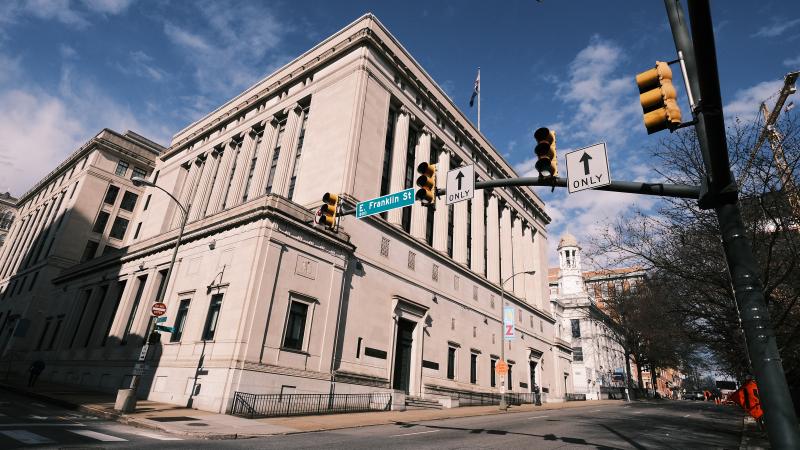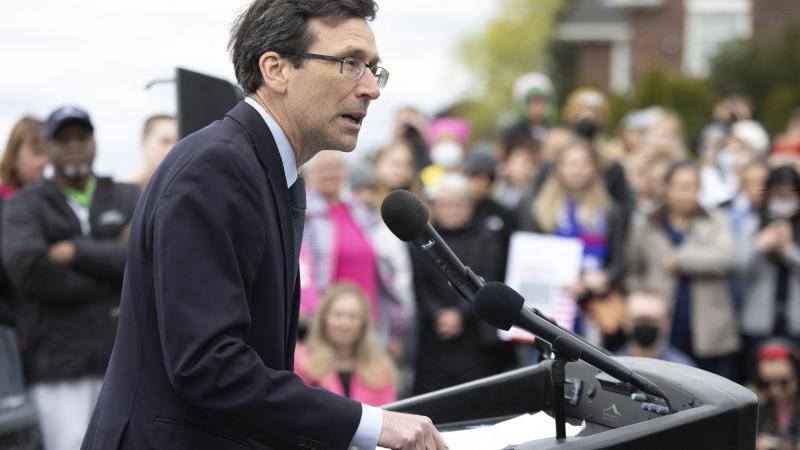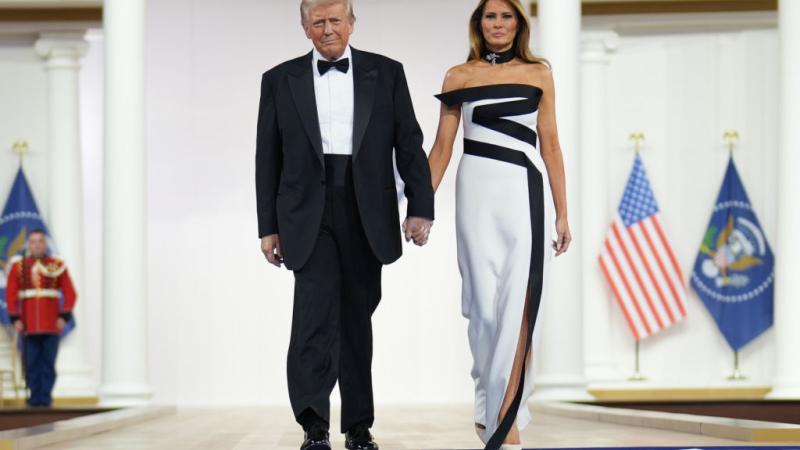Large-scale student loan cancellation could be latest in long line of Biden legal overreaches
Noting that all federal spending must first be appropriated by Congress, critics contend canceling hundreds of billions of dollars in debt via executive action violates the constitutional separation of powers.
Since President Biden entered office, federal courts across the country have repeatedly struck down administration policies as unconstitutional.
According to critics, there may soon be another addition to this long and growing list: Biden's announcement Wednesday that he will unilaterally cancel $10,000 of federal student loan debt for borrowers making less than $125,000 per year and up to $20,000 for Pell Grant recipients.
The Justice Department released a legal opinion stating the Higher Education Relief Opportunities for Students Act gives the education secretary the "authority to reduce or eliminate the obligation to repay the principal balance of federal student loan debt." The opinion also found the debt could be forgiven on a "class-wide" basis in response to COVID-19.
Advocates of student loan forgiveness have made similar arguments, pointing to language in the Higher Education Act of 1965 that empowers the education secretary to "enforce, pay, compromise, waive, or release any right, title, claim, lien, or demand, however acquired, including any equity or any right of redemption" to argue Congress isn't needed to cancel student loan debt on a large scale.
However, critics counter that the language refers just to settling loans on a case-by-case basis and doesn't give the executive branch the power to implement large-scale student loan cancellation.
These critics note all executive branch spending must first be appropriated by Congress and contend canceling student debt for millions of Americans via executive action violates the separation of powers fundamental to the Constitution.
In January 2021, when former President Trump was still in office, the Department of Education issued a legal memo saying the education secretary "does not have the statutory authority to cancel, compromise, discharge, or forgive, on a blanket or mass basis, principal balances of student loans, and/or to materially modify the repayment amounts or terms thereof."
The memo has been taken down from the department's website since Biden entered the White House.
None other than House Speaker Nancy Pelosi (D-Calif.), a Biden ally, told reporters last year that Biden didn't have the power to cancel student debt.
"That has to be an act of Congress ... the president can't do it," said Pelosi. "That's not even a discussion."
Biden himself has previously expressed reluctance about using executive authority to enact widespread student loan forgiveness, saying in December 2020: "I think that's pretty questionable. I'm unsure of that. I'd be unlikely to do that."
Critics of Biden's announcement are expected to launch legal challenges to stop it from being implemented.
Arguing that "the president does not have the authority to do this," economist Steve Moore told the "Just the News, Not Noise" TV show, "I think that Supreme Court is going to rule against Biden."
Noting that Biden "is using COVID emergency powers to allow people not to repay their loans," he asked, "[Does] that make any sense?
While it's unclear how federal courts would rule on such a case, it could become the latest of many examples of a Biden policy being struck down by federal courts for overstepping executive authority.
On the same day of Biden's announcement, for example, a federal court in Texas blocked the Biden administration from enforcing its new guidance requiring hospitals to provide emergency abortions regardless of the state's abortion restrictions.
After the Supreme Court in June overturned Roe v. Wade, which established a constitutional right to an abortion, the Department of Health and Human Services (HHS) ordered emergency room doctors to perform abortions when necessary.
Judge James Wesley Hendrix issued a preliminary injunction to block the order, noting that Texas already allows abortions in life-threatening conditions or for the removal of an ectopic pregnancy and that HHS issued the guidance without following federal law, which requires a period of time for notice and public comment.
Less than a week earlier, a federal judge barred the administration from pausing new oil and gas leases on federal lands.
U.S. District Judge Terry Doughty in the Western District of Louisiana handed down a permanent injunction, ruling the leasing moratorium was "beyond the authority of the president of the United States."
Biden had issued an executive order last year blocking new oil and gas leasing on federal lands while allowing leases on private lands and a continuation of existing leases.
Thirteen states proceeded to sue the government and got a preliminary injunction from Doughty blocking the order nationwide until last week, when the 5th U.S. Circuit Court of Appeals vacated the ruling and remanded the decision to the lower court. Doughty then issued the permanent injunction the very next day, although this time it applies only to the 13 states in the suit as opposed to the entire country.
In another energy-related case, the Supreme Court ruled in June that the Environmental Protection Agency can't put state-level caps on carbon emissions under the 1970 Clean Air Act. The broader takeaway, according to legal experts, is that the executive branch must identify clear statutory authority to take major actions with national political and economic impact.
Weeks earlier, the Supreme Court blocked the Biden administration from implementing a policy that prioritizes the detention and deportation of illegal immigrants who pose a threat to national security and public safety while limiting arrests for others in the country illegally.
Homeland Security Secretary Alejandro Mayorkas said that being present in the country illegally "should not alone be the basis" for arrest or removal. Republican attorneys general across the country filed suits getting the policy barred for the time being — the case will be heard in December.
In another recent immigration case, a federal judge in Louisiana in May blocked the Biden administration from lifting Title 42, the public health authority exercised by the Trump administration that allows border officials to expel migrants without allowing them to apply for asylum in order to limit the spread of COVD-19.
The court ruling has kept Title 42 in place indefinitely against the Biden administration's wishes, preventing some migrants from requesting asylum along the southern border.
These were hardly the first instances of the courts proving to be a roadblock for Biden's immigration agenda. Less than a week after Biden assumed office, for example, a federal court in Texas temporarily blocked the administration's 100-day moratorium on deportations of some illegal immigrants.
In its opinion, the court derided the administration for omitting "a rational explanation grounded in the facts reviewed and the factors considered." This omission, the court explained, made the Department of Homeland Security's "determination to institute a 100-day pause on deportations an arbitrary and capricious choice."
Perhaps most notoriously, federal courts have repeatedly shot down the Biden administration's various efforts to impose mandates requiring millions of Americans to get the COVID-19 vaccine.
In June, a federal appeals court in New Orleans agreed to reconsider its prior ruling that allowed the administration's COVID-19 vaccine mandate for federal workers. As a result, the federal worker mandate was blocked in accordance with an earlier ruling by a Texas-based federal judge.
As for the Biden administration's mandate requiring private businesses with 100 or more employees to ensure all workers get vaccinated or submit to weekly COVID-19 testing, the Supreme Court struck that down in January, ruling the Occupational Safety and Health Administration doesn't have the authority to issue such a sweeping rule.
"Administrative agencies are creatures of statute," said the court opinion. "They accordingly possess only the authority that Congress has provided. The secretary has ordered 84 million Americans to either obtain a COVID–19 vaccine or undergo weekly medical testing at their own expense. This is no 'everyday exercise of federal power.' It is instead a significant encroachment into the lives — and health — of a vast number of employees."
(The high court did allow a vaccine mandate to stand for medical facilities that take Medicare or Medicaid payments.)
Beyond vaccine mandates, the courts have quashed several other efforts by Biden to respond to COVID-19, deeming them unconstitutional.
Last June, for example, a federal judge ruled the Centers for Disease Control and Prevention can't dictate rules for cruise ships, ruling against the administration for exceeding its constitutional authority.
Then in August, the Supreme Court rejected the administration's federal moratorium on residential evictions.
Citing the economic fallout from the pandemic, the administration had imposed the moratorium, leading to a legal challenge from a coalition of landlords and real estate groups.
"The [CDC] has imposed a nationwide moratorium on evictions in reliance on a decades-old statute that authorizes it to implement measures like fumigation and pest extermination," the majority opinion read. "It strains credulity to believe that this statute grants the CDC the sweeping authority that it asserts."
"It is indisputable that the public has a strong interest in combating the spread of the COVID–19 Delta variant," the opinion added. "But our system does not permit agencies to act unlawfully even in pursuit of desirable ends"
"If a federally imposed eviction moratorium is to continue," the court ruled, "Congress must specifically authorize it."
Biden's losses in the courts have also extended to racial preferences. In Wisconsin, a federal judge halted Biden's controversial $4 billion race-based federal relief program for farmers. The court found "the only consideration in determining whether a farmer or rancher's loans should be completely forgiven is the person's race or national origin."
Therefore, the order continued, farmers were "experiencing discrimination at the hands of their government."
Language to the farm loan assistance program has since been changed to no longer mention race.
A federal court in Texas found similar discrimination by the Biden administration, but in a different context: restaurants.
The Restaurant Restoration Fund, approved by Congress to help struggling restaurants during the COVID-19 pandemic, gave preference to women, minorities, and "socially and economically disadvantaged" people, leading the court to deem the program discriminatory.
One of Biden's most notorious legal defeats was decided by the Supreme Court in June. In Terry v. United States, Tarahrick Terry, a criminal who pleaded guilty to possession with intent to distribute an unspecified amount of crack in 2008, argued for a sentence reduction under the First Step Act, former President Trump's criminal justice reform law.
Both the U.S. District Court for the Southern District of Florida and the U.S. Court of Appeals for the 11th Circuit ruled against Terry, who then petitioned to the Supreme Court. The Trump administration was preparing to defend its position and argue against Terry, noting that the First Step Act was meant to provide leniency to minor drug offenders sentenced to disproportionately long sentences and that Terry was in a different category.
Once in power, however, the Biden administration told the Supreme Court it wouldn't defend the ruling, calling it an error and siding with Terry. The high court ruled unanimously against the administration, dismissing its arguments as "sleight of hand."
Of course, it remains to be seen whether Biden's student loan forgiveness plan will be added to this non-exhaustive list. What's almost certain, however, is that the plan's fate will ultimately rest in the hands of federal judges if Congress doesn't pass a law.














